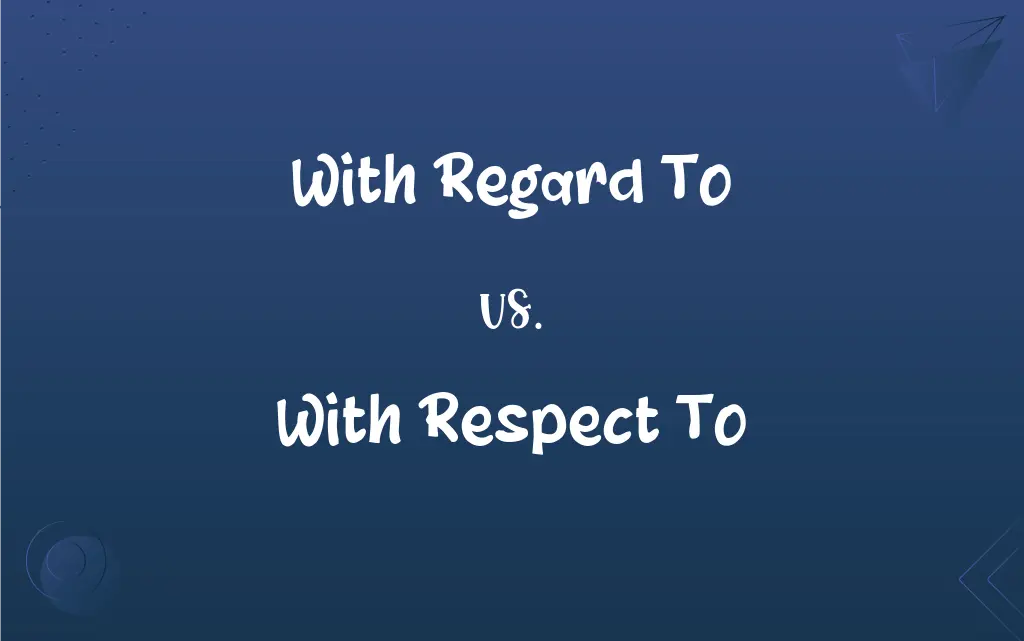With Regard To vs. With Respect To: What's the Difference?
Edited by Aimie Carlson || By Harlon Moss || Published on January 2, 2024
"With regard to" and "with respect to" are interchangeable phrases used to specify the topic or subject being discussed, with no significant difference in meaning.

Key Differences
"With regard to" is commonly used to direct attention to a specific subject or issue in a conversation or written discourse. Similarly, "with respect to" serves the same function, focusing the discussion on a particular topic or aspect.
Both phrases act as prepositional tools to provide clarity in communication, ensuring that the subject matter is clearly understood. "With regard to" and "with respect to" are equally useful in formal and academic contexts to introduce or emphasize a point of discussion.
"With regard to" might be slightly more colloquial, both phrases are equally acceptable in professional or formal writing. "With respect to" can sometimes sound more formal, but this distinction is minimal and largely based on personal preference.
In terms of usage, both "with regard to" and "with respect to" are versatile, fitting into various contexts without altering the overall meaning of the sentence. They are commonly used in business, academic, and legal communications to structure and clarify points.
The choice between "with regard to" and "with respect to" often comes down to style or rhythm in writing or speech. Neither phrase alters the fundamental meaning of the sentence or the intention of the speaker or writer.
ADVERTISEMENT
Comparison Chart
Meaning
Refers to a specific topic or subject.
Similarly refers to a specific topic or subject.
Formality
Slightly more colloquial but still formal.
Often perceived as slightly more formal.
Usage Contexts
Versatile in various communication contexts.
Similarly versatile in different contexts.
Frequency
Commonly used in both spoken and written English.
Equally common in formal written and spoken English.
Preference
Choice often based on stylistic preference.
Similarly chosen based on writing or speaking style.
ADVERTISEMENT
With Regard To and With Respect To Definitions
With Regard To
Introducing a specific topic within a conversation.
With regard to the event, we've finalized the guest list.
With Respect To
Referring directly to a specified topic in discussion.
With respect to the project deadline, we need more resources.
With Regard To
Focusing on a specified aspect of a broader discussion.
With regard to your proposal, I have a few suggestions.
With Respect To
Pertaining to or concerning a particular subject.
With respect to the new policy, there are some concerns.
With Regard To
Referring specifically to a certain topic or subject.
With regard to your inquiry, we will respond shortly.
With Respect To
Used when specifying or focusing on a certain aspect.
With respect to the team's performance, there's been improvement.
With Regard To
Used to introduce or emphasize a particular point.
With regard to the budget, we need to be more cautious.
With Respect To
Addressing or relating to a specific point or matter.
With respect to your question, here is our response.
With Regard To
Directing attention or response to a specific matter.
With regard to the schedule, we are on track.
With Respect To
Introducing or highlighting a particular issue or subject.
With respect to the recent changes, we need your feedback.
FAQs
Can they be used in casual conversation?
Yes, though they are more common in formal or professional settings.
Are these phrases common in business communication?
Yes, they are frequently used in business and professional contexts.
Do they belong to a specific genre of writing?
They are versatile and can be used in various writing genres.
Are these phrases interchangeable?
Yes, they can be used interchangeably without altering the meaning.
Can they be used at the beginning of a sentence?
Yes, they often introduce a topic at the beginning of a sentence.
Are these phrases suitable for legal documents?
Yes, they are commonly used in legal and formal documents.
Do they add clarity to communication?
Yes, they help specify and focus on particular subjects or topics.
Do they have synonyms?
Yes, phrases like "regarding" or "concerning" are similar.
Is one more formal than the other?
"With respect to" can sound slightly more formal, but the difference is minimal.
Is one more common in spoken English?
"With regard to" might be slightly more common in speech, but both are used.
Are they ever considered redundant?
Not usually, but context and sentence structure can affect this.
Can their usage affect sentence structure?
They typically introduce a clause, affecting the flow of the sentence.
Is one more prevalent in specific English dialects?
Not particularly; both are widely used across English dialects.
Is one preferred over the other in academic writing?
Both are acceptable; the choice often depends on the writer's style.
Are they used in journalistic writing?
Yes, they're used in journalism to specify topics.
Do they have any grammatical limitations?
They should be followed by a noun or noun phrase related to the topic.
Can they be overused in writing?
Overuse can make writing seem repetitive; it's best to use them judiciously.
Can they be used in email communication?
Yes, they are appropriate for emails, especially in formal contexts.
Is one more appropriate for technical writing?
Both are suitable for technical writing.
Do they change the tone of a sentence?
They can make a sentence sound more formal or focused.
About Author
Written by
Harlon MossHarlon is a seasoned quality moderator and accomplished content writer for Difference Wiki. An alumnus of the prestigious University of California, he earned his degree in Computer Science. Leveraging his academic background, Harlon brings a meticulous and informed perspective to his work, ensuring content accuracy and excellence.
Edited by
Aimie CarlsonAimie Carlson, holding a master's degree in English literature, is a fervent English language enthusiast. She lends her writing talents to Difference Wiki, a prominent website that specializes in comparisons, offering readers insightful analyses that both captivate and inform.







































































